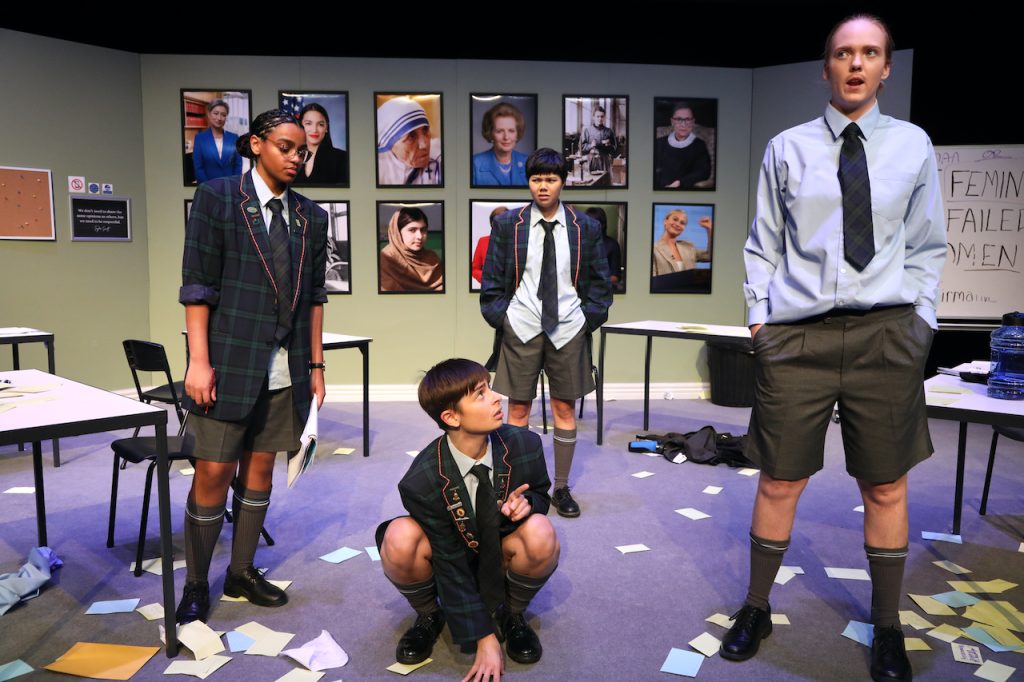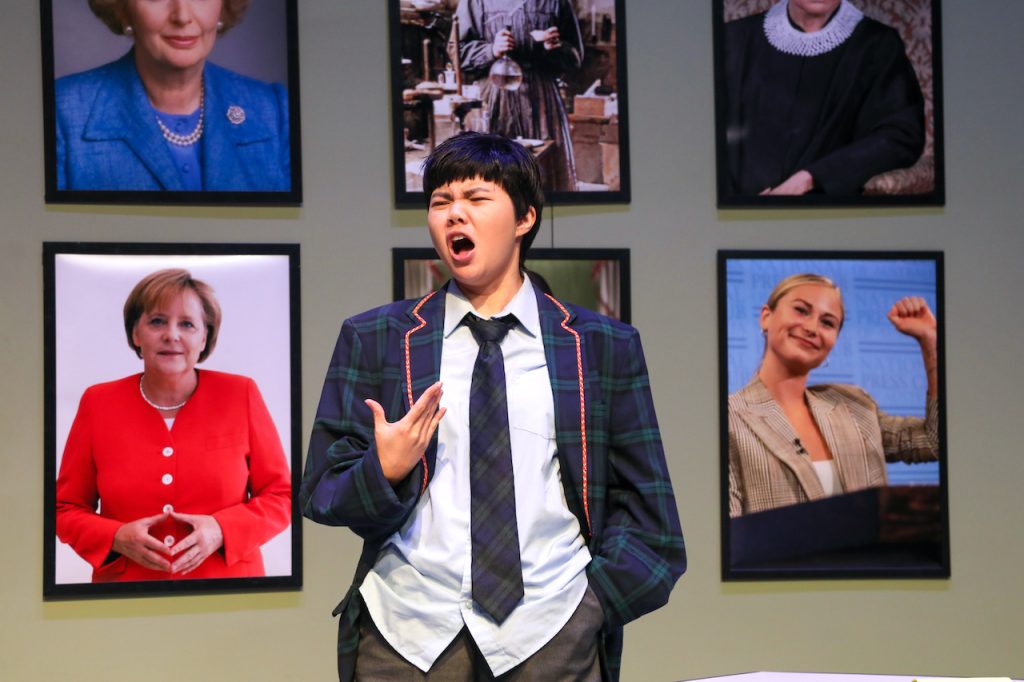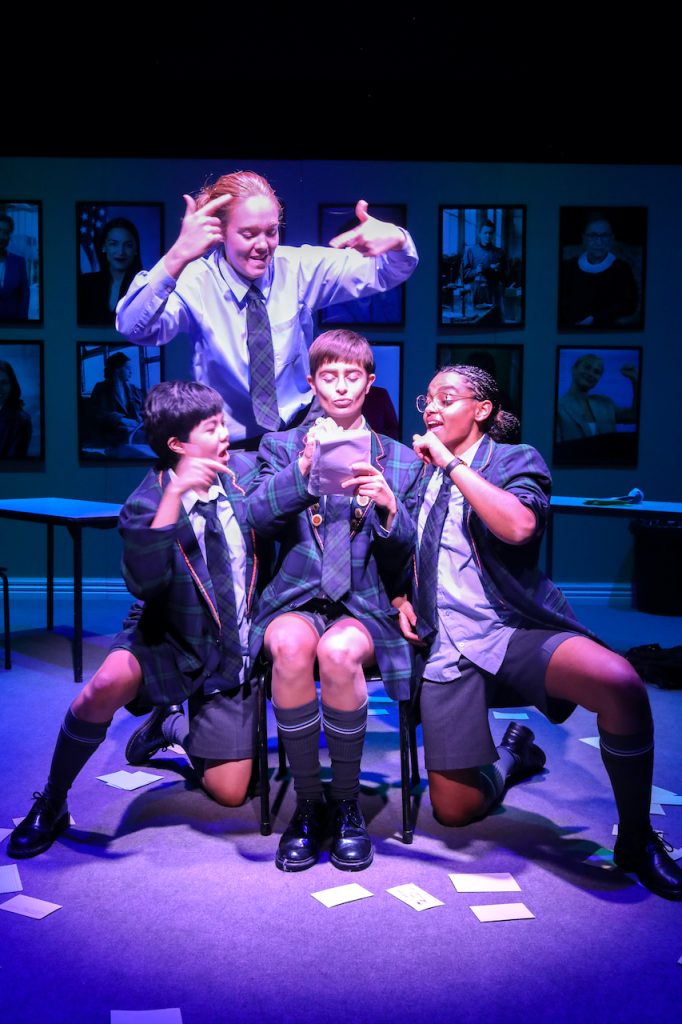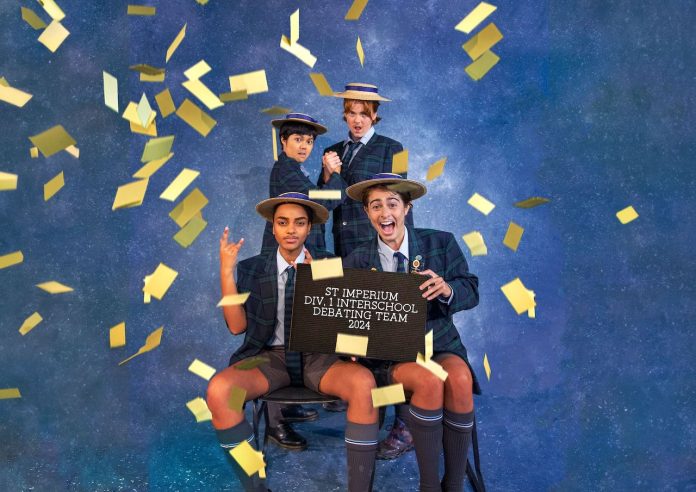Melbourne-based playwright Emmanuelle Mattana has always had a complex relationship with the world of competitive debating.
“I had been a competitive debater in high school,” Mattana explains. “Debating taught me to think critically and come up with my own opinions.”
But when allegations of a historical sexual assault emerged against Christian Porter in 2021, Mattana was forced to re-examine the undercurrent of elitism that the sport breeds.
“The alleged assault took place at a debating championship in Sydney. It shocked me because it is a world I am so familiar with,” Mattana says.
This allegation was the driving force behind Trophy Boys, Mattana’s debut play that just ended its run at Sydney’s Seymour Centre. Making its debut in 2022, the play is a subversive satire that confronts the toxic masculine culture pervading private boys’ schools across Australia.

Using drag performance, the female and non-binary cast of four (Leigh Lule, Emmanuelle Mattana, Gaby Seow and Fran Sweeney-Nash) play an all-boys debating team on the Grand Finale of their Inter-School Debating Tournament.
By using drag, Mattana wanted to make the audience more aware of the fact that gender is a performance. “Drag performance reminds the audience that gender is something you can take off, like a costume.”
Mattana, who plays the high school debater Owen, says the process of becoming their characters gave them surprising insight into how toxic masculinity is a learned behaviour that boys are taught from a young age.
“The cast and I always had this sense of being super self-conscious of our actions. Is my voice too high-pitched? Am I popping my hip too much?” Mattana says. “It really gave us insight into the way men police themselves and their expressions so that they’re not perceived as too feminine.”
Performing a male role also enabled Mattana to take up space in a way they haven’t done before when playing female or non-binary characters. This permission to take up space in such an excessive manner, often referred to as ‘manspreading’, prompted many interesting responses from audience members.
Mattana recalls one woman who went home after seeing the play to witness her husband sitting on the couch exactly like the teenage boys on stage.
“She’d been married to this man for 20 years, but had never noticed his manspreading before!” Mattana says. “There was something about seeing us manspreading all over the place that was so obnoxious that she told her husband to stop.”

Given that men with a background in elite private boys’ schools occupy many of the highest positions of power in this country, disrupting the toxic masculine culture within these school environments would be an important step towards gender equality.
Mattana hopes that Trophy Boys can be used as a tool to facilitate discussions around gender norms, sexual assault and consent, especially among high school students. Already, the play has been placed on the curriculum in many schools across Melbourne and Sydney.
“The response from teenagers has been exciting,” Mattana says. “I’ve always been a big believer that theatre is one of the best places to have difficult conversations. It’s much easier to open up with each other through the lens of character, rather than through the lens of reality.”
But while it is an important tool in the discussion around gender issues, independent theatre in Australia is a chronically underfunded area of the arts. Many theatres that support emerging playwrights are being forced to shut their doors. This is the case for Melbourne theatre company La Mama, which was responsible for launching Trophy Boys to begin with.

Mattana says that until independent theatre is funded properly, we will miss out on hearing many important voices, particularly queer voices.
“I think queer voices will continue to have a leading role in discussions around gender,” Mattana says. “We can challenge gender norms in a unique way. We have always been able to see beyond the binary.”
WRITER Emmanuelle Mattana DIRECTOR Marni Mount DESIGNER Ben Andrews LIGHTING DESIGNER Katie Sfetkidis. CAST: Leigh Lule (she/they), Emmanuelle Mattana (she/they), Gaby Seow (she/her) and Fran Sweeney-Nash (They/Them)
Trophy Boys just ended its season at the Seymour Centre, Sydney (19 June–7 July), and continues its tour playing at Arts Centre Melbourne (16–21 July); St Albans Bowery Theatre, Melbourne (16 July); The Arts House Wyong (2–3 August), and Canberra Theatre Centre (6–10 August).


